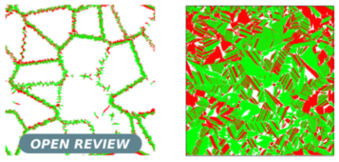Observation of the two-way shape memory effect in an atomistic model of martensitic transformation
DOI:
https://doi.org/10.4279/pip.090004Keywords:
Martensitic transformation, Shape memory effect, Numerical simulationsAbstract
We study a system of classical particles in two dimensions interacting through an isotropic pair potential that displays a martensitic phase transition between a triangular and a rhomboidal structure upon the change of a single parameter. Previously it was shown that this potential is able to reproduce the shape memory effect and super-elasticity, among other well known features of the phenomenology of martensites. Here we extend those previous studies and describe the development of the more subtle two-way shape memory effect. We show that in a poly-crystalline sample, the effect is mostly due to the existence of retained martensite within the austenite phase. We also study the case of a single crystal sample where the effect is associated to particular orientations of the dislocations, either induced by training or by an ad hoc construction of a starting sample.
Received: 16 January 2017, Accepted: 23 March 2017; Edited by: L. Viña ; Reviewed by: J. Pons, Universitat de les Illes Balears, Palma de Mallorca, Spain; DOI: http://dx.doi.org/10.4279/PIP.090004
Cite as: E. A. Jagla, Papers in Physics 9, 090004 (2017)
This paper, by E. A Jagla, is licensed under the Creative Commons Attribution License 3.0.

Downloads
Published
How to Cite
Issue
Section
License
Authors agree to the PIP Copyleft Notice













